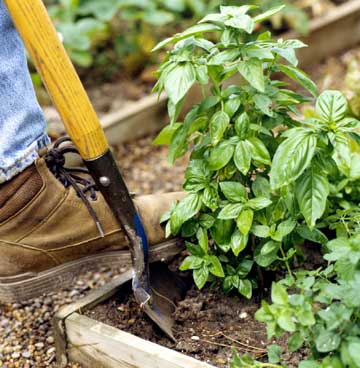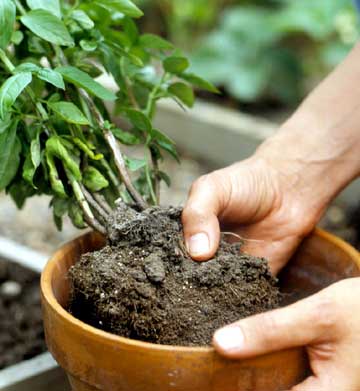






Growing herbs indoors lets you enjoy the delights of fresh-picked herbs year-round. As summer ends, transplant herbs from the garden to pots and move them indoors. Select plants, including immature annuals or tender perennials, and dig carefully around their roots to avoid damaging them. Annuals, such as this basil, will continue growing into winter. Return perennials to the garden in spring.
Get inspired to add more herbs to your garden with this list of an herb-lover's favorites.
continue reading below
Select a container large enough to accommodate a plant's root ball, allowing room for growth. Leave some garden soil on the plant's root ball. Partially fill the pot with potting soil. Set the root ball on top of the soil; fill in around it with more soil. Water thoroughly. Leave your newly potted plants outdoors in a lightly shaded location for about a week to help them begin acclimating to their new home. Before you bring plants indoors, inspect them thoroughly for hitchhiking insects. Flush the soil with water and rinse off the foliage, using a blast of water from the garden hose to chase away any pests and avoid later problems.
When bringing your herb plants indoors, expect them to adjust during the first few weeks. Plants typically drop a few leaves and grow more slowly. Help plants acclimate to life indoors and thrive during winter by placing them in a window that receives at least six hours of sun daily. Pinch off the tips of stems periodically to stimulate lush growth. Water when the soil feels dry to a depth of 1 inch. Mist the air around plants once a week to boost the humidity level.
If you live in a frost zone, keep tender perennial herbs going from year to year by bringing them indoors over winter. Lemongrass, ginger, bay, rosemary, scented geranium, and lemon verbena, for example, require protection from cold weather to survive. Also bring in lavender, tricolor sage, pineapple sage, and heliotrope.
Rosemary, a tender perennial, can grow year-round in a container. To raise it successfully indoors, be sure to circumvent the dry air that develops in heated homes during winter. Watering often is not the answer: Constantly wet soil damages rosemary's roots. Instead, mist frequently around the plant to help raise the humidity level and also help deter red spider mites, which are the bane of rosemary grown indoors.
Copyright © www.100flowers.win Botanic Garden All Rights Reserved